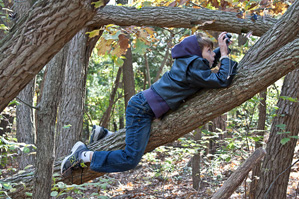One reason not to overschedule your kids

A debate has emerged in the last few years about the importance of early interactions with nature. Kids these days tend to spend more time inside in front of screens and less time outside wandering around aimlessly. As a result, parents and researchers alike are curious about the impacts of such a change. There’s even a bill in Washington about it. Recent work from Northeastern professor of psychology John Coley adds some context to the debate and is, to my mind, crazy-interesting.
In an article published in the journal Child Development earlier this year, Coley presents data showing the difference between rural, suburban, and urban children’s tendency to make ecological associations.
In the study, they asked 346 Massachusetts school children, aged 6, 8, or 10, to answer a couple of questions about animals. The researchers presented the kids with groups of three plants or animals like the following:
Then they’d be told one of two statements: Either: “The cattail has sarca inside.” Or: “The cattail has a disease called sarca.”
Then the researchers asked which of other two organism is most likely to also have sarca (which by the way, is a totally made up thing).
The kid has two choices: either the dandelion has sarca, which would make sense since cattails and dandelions are both plants. Or the bullfrog has sarca, which would make sense because frogs live near cattails.
The first answer demonstrates some taxonomical abilities, the child is able to make distinct categorical inferences between plants and animals. The second answer requires a little bit more nuanced thinking, which Coley calls “ecological reasoning.”
In Coley’s study, rural kids as young as six years old clearly demonstrated sound ecological reasoning. Suburban kids started showing this ability around age 8 and urban kids not until age 10.
But here’s my favorite part: the researchers also asked the kids a few other questions about how they like to spend their time and what kinds of structured outdoor activities they’ve been involved in. Across all three demographics, it didn’t matter how much structured time they’d had with nature. If they went to zoos or aquariums with school or took care of pets at home, the results remained the same. BUT, if the kids reported spending time exploring the natural world on their own with no real structure around the activity, they were MORE LIKELY to demonstrate ecological reasoning abilities earlier, regardless of the demographic.
Essentially, kids that wandered around aimlessly in the outdoors were better at making complex associations about the natural world.
“I think it’s really cool because I think it suggests that people are just sort of designed to pick up on these kinds of relations,” said Coley. “And the way to become knowledgeable and sensitive to them in nature is just to explore.”
They also asked the kids to riff on the way they spend their time, rather than asking directed, yes or no questions. This led to the secondary finding that the way children think is much more systematic than we might suspect.
“A lot of times you might think that kids’ ability to report what they do and what they’re interested in might be kind of unreliable,”said Coley. “But I think the clear and strong relations between kid’s reported activity and they way they’re thinking on this task shows that the way they’re talking about their activities aren’t just whimsical.”
This research falls into Coley’s larger body of work about the complex, categorical inferences we make on a minute-to-minute basis without really thinking about it. When asked whether urban kids are at a disadvantage because of this outcome, he said it’s really case determinate. If we did a similar study about social diversity, Coley said, urban kids might be more likely to demonstrate complex reasoning abilities than their rural counterparts simply because they’ve had more chances to interact with a diverse population.







